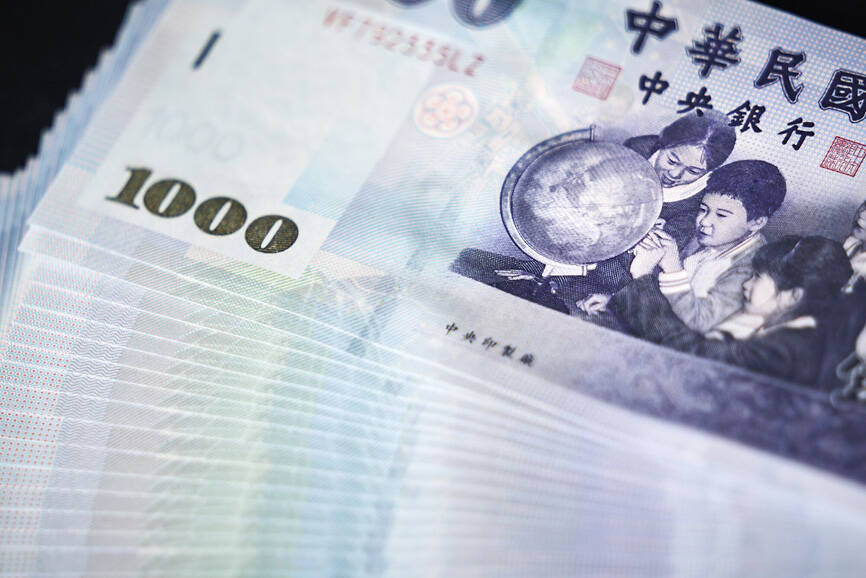Tax revenue generated from securities transactions and vehicle sales declined sharply last month from a year earlier amid uncertainties over US trade policies, the Ministry of Finance said on Tuesday.
Securities transaction tax revenue was NT$23.9 billion (US$797.73 million) last month, down by a double-digit percentage compared with the year-earlier result for the fifth consecutive month, ministry statistician Liu Shun-rong (劉訓蓉) said, attributing the retreat to a high base effect.
However, the figure was still the highest in 11 months, as the TAIEX rebounded 5.8 percent last month, supported by US approval of Nvidia Corp’s sales of less-advanced chips to China, positive sales guidance from Taiwan Semiconductor Manufacturing Co (台積電), and US tariff agreements with Japan and other countries, Liu said.

Photo: An Rong Xu, Bloomberg
However, market activity remained subdued due to lingering concerns about the US’ tariff rates on Taiwanese goods, she said.
Average daily trading was NT$412.9 billion last month, down 29.4 percent year-on-year and marking a sixth month of consecutive declines, she said.
However, early data for this month suggest a continued market recovery, with average daily trading value rising to about NT$497.8 billion, slightly exceeding the year-earlier figure.
Liu expressed cautious optimism that increased trade volume could help revive securities transaction tax revenue, although she said that the situation remains fluid.
In the automotive sector, there was a significant downturn in tax revenue amid market anticipation of potential tariff and commodity tax cuts, as trade negotiations between Taiwan and the US pan out, Liu said.
New vehicle sales last month fell 22.3 percent from the same month last year to 35,483 units, with sales of imported vehicles also declining 25.6 percent year-on-year to 15,914 units, government data showed.
As a result, vehicle commodity tax revenue plunged 45.6 percent year-on-year to NT$4.6 billion last month, marking the steepest drop in more than two-and-a-half years.
Taxes collected from import levies on passenger vehicles last month fell 61.5 percent annually to NT$1.5 billion, Liu said.
Overall, Taiwan’s tax revenue last month surged threefold to NT$876.8 billion from a year earlier, driven mainly by deferred tax filings, the ministry said.
Individuals and companies typically file income taxes in May, but this year the government granted a 30-day extension to ease the impact of external shocks related to US tariffs.
For the year to date, cumulative tax revenue totaled NT$2.3 trillion, a 2.1 percent decline compared with the same period last year, the ministry said.

Sweeping policy changes under US Secretary of Health and Human Services Robert F. Kennedy Jr are having a chilling effect on vaccine makers as anti-vaccine rhetoric has turned into concrete changes in inoculation schedules and recommendations, investors and executives said. The administration of US President Donald Trump has in the past year upended vaccine recommendations, with the country last month ending its longstanding guidance that all children receive inoculations against flu, hepatitis A and other diseases. The unprecedented changes have led to diminished vaccine usage, hurt the investment case for some biotechs, and created a drag that would likely dent revenues and

Global semiconductor stocks advanced yesterday, as comments by Nvidia Corp chief executive officer Jensen Huang (黃仁勳) at Davos, Switzerland, helped reinforce investor enthusiasm for artificial intelligence (AI). Samsung Electronics Co gained as much as 5 percent to an all-time high, helping drive South Korea’s benchmark KOSPI above 5,000 for the first time. That came after the Philadelphia Semiconductor Index rose more than 3 percent to a fresh record on Wednesday, with a boost from Nvidia. The gains came amid broad risk-on trade after US President Donald Trump withdrew his threat of tariffs on some European nations over backing for Greenland. Huang further

CULPRITS: Factors that affected the slip included falling global crude oil prices, wait-and-see consumer attitudes due to US tariffs and a different Lunar New Year holiday schedule Taiwan’s retail sales ended a nine-year growth streak last year, slipping 0.2 percent from a year earlier as uncertainty over US tariff policies affected demand for durable goods, data released on Friday by the Ministry of Economic Affairs showed. Last year’s retail sales totaled NT$4.84 trillion (US$153.27 billion), down about NT$9.5 billion, or 0.2 percent, from 2024. Despite the decline, the figure was still the second-highest annual sales total on record. Ministry statistics department deputy head Chen Yu-fang (陳玉芳) said sales of cars, motorcycles and related products, which accounted for 17.4 percent of total retail rales last year, fell NT$68.1 billion, or

HSBC Bank Taiwan Ltd (匯豐台灣商銀) and the Taiwan High Prosecutors Office recently signed a memorandum of understanding (MOU) to enhance cooperation on the suspicious transaction analysis mechanism. This landmark agreement makes HSBC the first foreign bank in Taiwan to establish such a partnership with the High Prosecutors Office, underscoring its commitment to active anti-fraud initiatives, financial inclusion, and the “Treating Customers Fairly” principle. Through this deep public-private collaboration, both parties aim to co-create a secure financial ecosystem via early warning detection and precise fraud prevention technologies. At the signing ceremony, HSBC Taiwan CEO and head of banking Adam Chen (陳志堅)